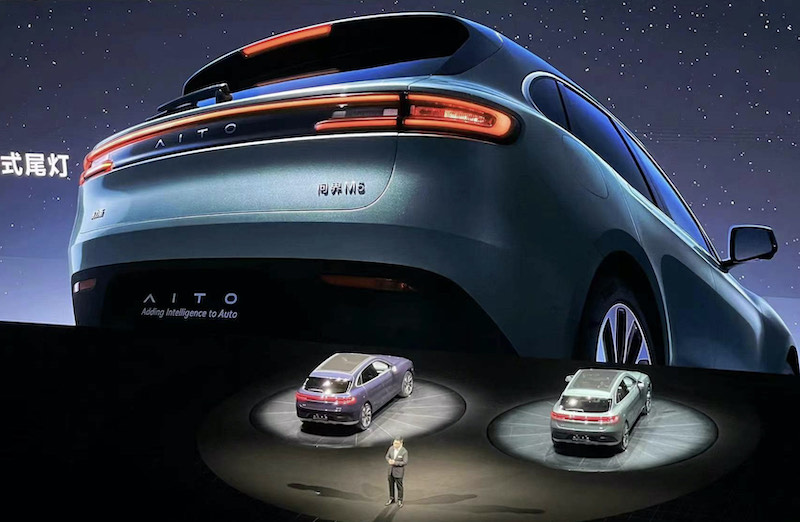Huawei Technologies’ new smart car venture is set for a valuation of near to $35 billion as it finds backing from multiple state-backed automakers including Changan Auto.
The firm – which will develop software and components for electric smart cars – is a spin-off of Huawei’s four-year-old Intelligent Automotive Solution (IAS) business unit.
The spin-off, announced on Sunday, marks another step ahead for Huawei, which is charting a return from near ruin after US sanctions in 2019 pounded its business.
Also on AF: COP28 – Cities Give A Glimpse of Changes Sweeping the World
Huawei will likely remain the single largest shareholder in the firm with a 40% to 50% stake for at least the next two-to-three years, sources said.
Chongqing Changan Automobile and its ultimate parent, state-owned China Ordnance Equipment Group – also known as China South Industries Group – are considering acquiring about 35% and 5% respectively of the new firm, which could be valued at 200 billion to 250 billion yuan, sources said.
Changan will be the firm’s main auto partner. A statement from the automaker on Sunday confirmed that it, along with relevant parties, will own up to 40% of the new firm.
Potential minority shareholders include state-owned automakers FAW Group and Dongfeng Motor Group, which are also in advanced talks with Huawei to acquire up to 5% each, sources said.
Deal details – notably the ownership split and valuation – have not been finalised and are subject to change, sources said. The transaction will also be subject to regulatory approval, they added.
Huawei’s R&D spending in focus
The spin-off is rare for Huawei whose businesses including telecommunications and consumer electronics have been owned by founder Ren Zhengfei and close to 100,000 shareholding employees since the firm’s 1987 founding.
A year after it was subjected to US sanctions on security grounds, Huawei sold budget smartphone label Honor to keep the brand alive.
Three of the people said one reason for the planned sale is that Huawei has struggled to grow the smart car business and needs to recoup capital to cover research and development (R&D) spending.
Huawei senior executives including Ren initially pinned high hopes on the unit to be a new growth driver, said the people.
It has invested $3 billion in the unit since its inception and grown its R&D team to 7,000 people, the company’s 2022 annual report showed.
But it was the only money-losing unit among Huawei’s main six and brought in one billion yuan revenue in the first half of 2023, a fraction of the company’s 310.9 billion yuan total, Huawei said in August.
Listing ambitions
Huawei has said the new unit will engage in R&D, production, sales and service of intelligent automotive systems and component solutions. It will receive the IAS’s core technologies and resources.
It will also absorb the group’s other auto-related assets and resources outside the IAS business unit, one of the sources said.
Huawei is considering locating the new firm’s headquarters in Chongqing, a sprawling southwestern municipality where Changan is based, said two of the people. The unit is currently headquartered in Shanghai.
The proposed deal will also smooth the way for the business’ listing, as Huawei had planned, said two of the people.
Richard Yu, head of Huawei’s consumer business and who has overseen the smart car unit for years, is unlikely to lead the new firm, one of the people said without elaborating.
Backed by sales
Huawei has repeatedly said it does not make cars on its own but only helps other automakers make better vehicles.
It has an existing partnership with Changan involving EV brands Avatr and Deepal. It also has partnerships with Jianghuai Automobile and Seres Group. Huawei and Seres jointly produce Aito branded cars, including the M7 model.
Huawei has also built the S7 sedan with Chinese automaker Chery under a new marque, Luxeed, that it intends to position as a competitor to Tesla’s Model S.
The company said in October it had received more than 50,000 orders for its revamped M7 model during the first 25 days of sales, which would put Aito among China’s five top-selling new energy vehicle manufacturers based on August data.
- Reuters, with additional editing by Vishakha Saxena
Also read:
Huawei Comeback Drive Fuelled by Hit EV and Patriotic Fervour
Apple Outshone by Huawei, Xiaomi on China’s Singles Day
Huawei, US-Sanctioned Firms Win as China Dumps Western Tech
Huawei Supplying AI Chips to China’s Baidu in Blow to Nvidia
Huge Huawei Sales Boom Turns Around China Smartphone Market
Huawei Keeps Mum on China-Made Chips Behind Mate 60 Phones
























